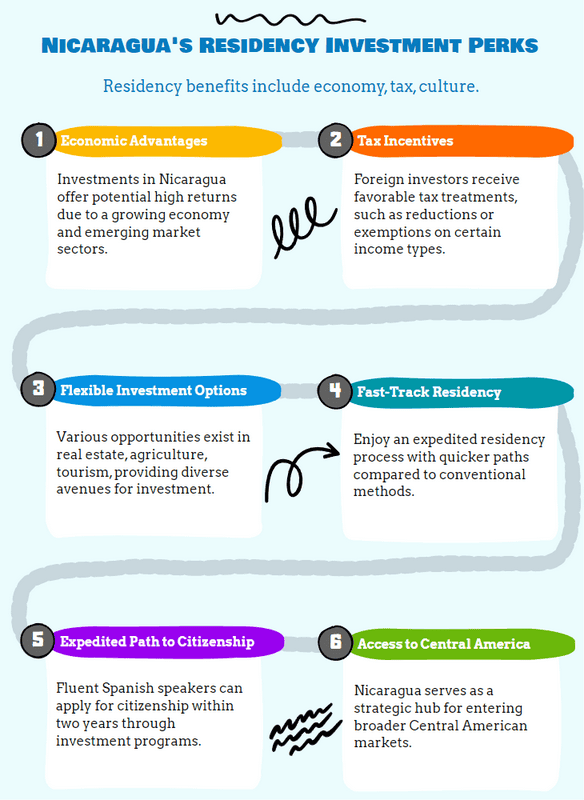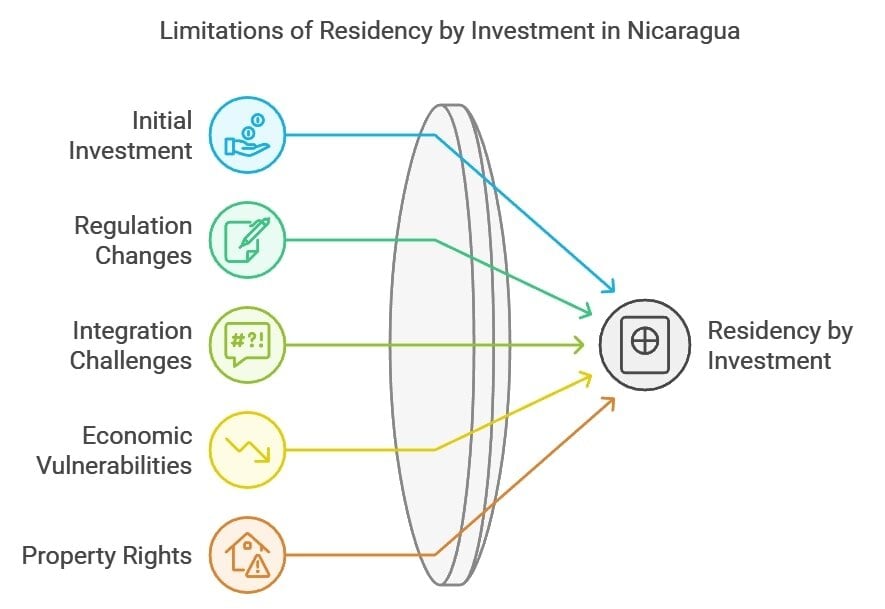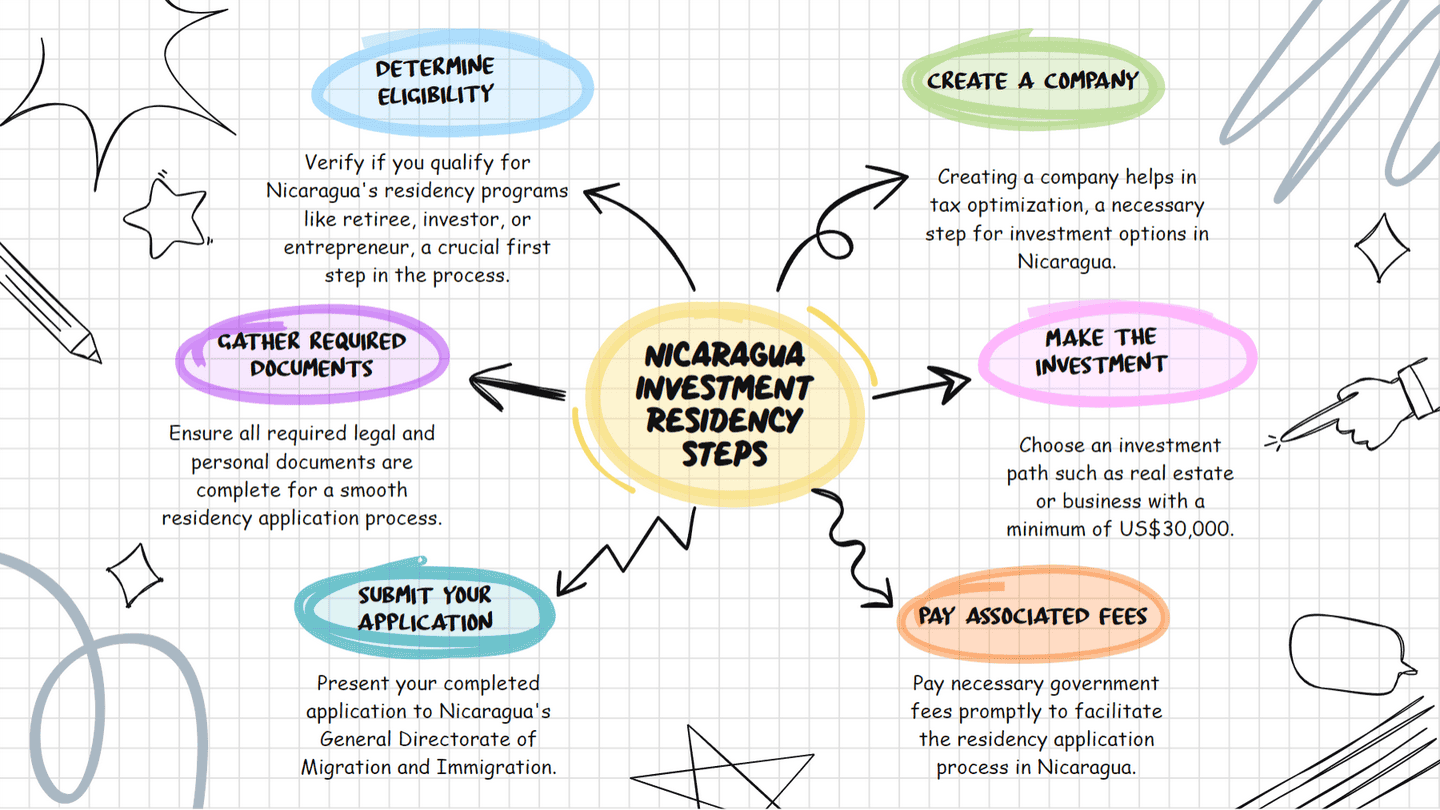Nicaragua Residency By Investment
Boost Your Freedom Without Compromise.
- Who offers the CHEAPEST program available.
- Who offers the BEST program available.
- What you need to qualify?

- Nicaragua provides residency by investment opportunities primarily targeted at individuals who invest in real estate, agriculture, or other sectors that contribute to the country's economic development.
- The investment threshold is relatively low compared to other countries, making it an attractive option for investors looking for affordable entry points into residency by investment programs.
- Benefits include access to a country with rich natural resources, growing tourism, and agricultural sectors, and the potential for significant returns on investment in these areas.
- The residency application process involves submitting proof of investment, undergoing a background check, and meeting health and financial sufficiency criteria. The process is generally streamlined, but thorough preparation and local legal guidance are advised.
- While it offers numerous benefits, investors should also consider the country's political landscape and economic stability when planning their investment to ensure it aligns with their long-term residency and lifestyle goals.
Nicaragua, a land known for its breathtaking volcanoes and the world's largest freshwater lake in a tropical region, offers more than just scenic beauty.
Beyond its natural wonders, Nicaragua also has a rapidly growing economy and teems with potential.
In This Article, You Will Discover:
Dive into the untapped potential of the Nicaragua residency by investment program with us and discover the benefits waiting for discerning investors.
*Disclaimer: All figures and amounts quoted in this article were correct and accurate at the time of publication and may have shifted since.
- Who offers the CHEAPEST program available.
- Who offers the BEST program available.
- What you need to qualify?
 Free Consultation
Free Consultation Easy to Use
Easy to Use 100% Safe & Secure
100% Safe & Secure
What Are the Benefits of Residency by Investment in Nicaragua?
The benefits of residency by investment in Nicaragua range from the joy of its scenic beauty to potential tax advantages for foreign investors.

Let’s get into the finer details:
- Economic advantages: There’s potential for a substantial return on your investment, given Nicaragua's rapidly growing economy and developing sectors.1
- Tax incentives: There are favorable tax treatments for foreign investors, including tax breaks or reductions on certain types of income.
- Flexible investment options: Investment options offer diverse opportunities ranging from real estate, agriculture, tourism, and more.
- Fast-track residency: It’s an accelerated process for gaining residency compared to traditional methods, with potential paths to citizenship.
- Expedited pathway to citizenship: If you’re a fluent Spanish speaker, Nicaragua’s residency by investment program allows you to apply for citizenship within 2 years.
- Access to Central America: Nicaragua is a strategic location as a gateway to other Central American markets and opportunities.
- Natural beauty and culture: Residents get the opportunity to live in a country with stunning landscapes, beaches, volcanoes, and a rich cultural heritage.
- Lower cost of living: Compared to many western countries, Nicaragua offers a more affordable lifestyle without compromising on quality.
- Safety and stability: Despite past challenges, Nicaragua's political and social environment has been stabilizing, making it safer for investors and expatriates.
- Free trade agreements: Nicaragua has several FTAs that can benefit businesses by offering access to larger markets with reduced tariffs.
- Import 1 motor vehicle: You can import a vehicle to the value of US$25,000 or less, for personal or general use. You won’t be charged import tax, and you’ll be entitled to sell it after 5 years.
- Transport your household goods to Nicaragua: You can import goods to the value of US$20,000 duty-free.
- Education and health benefits: Residents enjoy access to local health and education services (with many international schools), often at a fraction of the cost compared to other countries.
What Are the Limitations of Residency by Investment in Nicaragua?
The limitations of residency by investment in Nicaragua needn’t put you off; all the same, we feel it’s important to be apprised of the pros and cons of any potential investment opportunity.

In our opinion, these are the main limitations of the residency by investment program:
- Initial investment requirements: Although Nicaragua’s program has a lower minimum investment requirement compared with some other countries, a significant upfront investment is often needed, which might be out of reach for some individuals.
- Regulation changes: The residency by investment landscape can change, with policies and requirements potentially becoming stricter or evolving over time.
- Integration challenges: Cultural, linguistic, and social differences might pose integration challenges for new residents unfamiliar with Nicaraguan customs.
- Economic vulnerabilities: Nicaragua, like other emerging markets, may have economic vulnerabilities, including fluctuations in local currency or industries.
- Property rights concerns: Though improving, there have been concerns about property rights and land ownership clarity in Nicaragua in the past.
- Limited global recognition: Nicaraguan residency or citizenship might not offer as extensive visa-free travel or global recognition as some other countries' programs.
- Infrastructure and services: Although it’s a developing country, some areas may lack the infrastructure or services that investors from developed nations are accustomed to.
- Renewal and maintenance: Continuous investment or maintenance might be needed to retain residency or fulfill other long-term requirements.
- Due diligence: The Nicaraguan government may conduct thorough background checks, which can be time-consuming and require extensive documentation.
- Political sensitivities: Despite improving stability, there may still be some political sensitivities and uncertainties to be aware of.
Which Investment Types Qualify for Residency by Investment in Nicaragua?
Different investment types qualify for residency by investment in Nicaragua.
Our expert team has listed them for you below:
- Real estate investment
- Business investment
- Special project investment, specifically government-approved forestry or agricultural projects
What Are the Eligibility Requirements for Residency by Investment in Nicaragua?
The eligibility requirements for residency by investment in Nicaragua are some of the most accessible globally.
Let’s get into them in more detail.
Minimum Investment Amount to Qualify
For residency by investment in Nicaragua, applicants are required to invest a minimum of US$30,000.
In return for this investment, you’ll be granted immediate permanent residency in the country.
Language Requirements to Qualify
Although the official language of Nicaragua is Spanish, you don't need to be fluent in Spanish to obtain residency by investment in Nicaragua.
However
Should you choose to graduate to full Nicaraguan citizenship, you’ll need to prove your Spanish proficiency.
Nationalities Restricted from Applying
Nicaragua doesn’t explicitly restrict any nationalities from applying for its residency by investment program.
If you can make the minimum investment and pass the due diligence process, you can apply.
Will My Dependents Be Included Under My Nicaraguan Residency Permit?
Yes, your dependents will be a part of your Nicaraguan residency by investment permit.
Bear in mind that including your dependents in your application may incur additional fees.
How Long is the Nicaraguan Residency by Investment Valid & Can It Be Extended?
The Nicaraguan residency by investment permit has a generous validity period and offers investors the opportunity for a fast-track path to full citizenship.
Here’s the lowdown:
Validity Period
Your Nicaraguan residency by investment permit confers permanent residency on you and is valid initially for 5 years.
Note this condition:
You’ll need to be physically present in Nicaragua every 6 months to renew your Nicaraguan ID (or “cedula”).
Visa Extension
You can renew your permanent residency in Nicaragua after the initial 5-year validity period if you choose to.
Alternatively, you may wish to pursue the expedited route to Nicaraguan citizenship.
What’s the Application Process for Residency by Investment in Nicaragua?
The application process for residency by investment is relatively straightforward.
We’ve broken down the entire process for you below.
Step-by-Step Application Process
As always, our seasoned team is on hand to simplify things, so we’ve broken down the application process into basic steps for you.

For those looking to obtain investment residency in Nicaragua, a general approach is as follows:
Step 1: Determine Eligibility
Check if you qualify for any of the residency programs available (e.g., retiree, investor, or entrepreneur).
Step 2: Create a Company & Select the Appropriate Investment Type
Would-be investors in Nicaragua are often advised to create a company in Nicaragua.
This facilitates tax optimization, regardless of the investment route you choose.
Bear in mind
The company must have 2 shareholders.
If necessary, you can set up the company with yourself as a 99% shareholder, while 1% is held by an appointed lawyer, who can then relinquish all rights.
Step 3: Gather Required Documents
Ensure that your application and all supporting documents are complete in order to facilitate a smooth application process.
Step 4: Make the Investment
Once you’ve chosen your investment type (real estate, business, or a special forestry or agricultural project), you’ll need to make an investment of at least US$30,000.
Step 5: Submit Your Application
Submit your application along with all the supporting documents to the General Directorate of Migration and Immigration in Nicaragua.
Step 6: Pay Associated Fees
There will be government fees associated with your residency by investment application.
Ensure that all associated fees are paid promptly to ensure streamlined processing.
Step 7: Wait for Approval
After submitting, there’s a waiting period during which the immigration authorities review your application.
Step 8: Receive Residency Card
Once approved, you'll be issued a Nicaraguan residency card (or “cedula”).
Required Documents
As discussed above, you’ll want to ensure that you submit your Nicaragua residency by investment application with a full set of supporting documents.
Gather the following documentation:
- Completed application form or letter
- Birth certificate
- Health certificate
- Marriage certificate (if applicable)
- Criminal record certificate
- Copies of company incorporation (if applicable)
- Investment registration certificate (if applicable)
- Card, single taxpayer registration
- Investment support documentation. These include invoices, receipts, deeds of purchase of real estate, purchases of inputs, vehicle fleets, professional services, office equipment, machinery, or payroll.
- Original passport and photographs
What Costs Are Involved in Getting Residency by Investment in Nicaragua?
The costs involved in getting residency by investment in Nicaragua include the application cost, legal and advisory costs, and additional fees.
That’s not to mention the minimum investment amount of US$30,000.
Here’s the breakdown for your budget:
Application Costs
The application costs can be broken down into government fees and application processing fees.
We’ve summarised the main costs for you:
- Government fee per applicant: US$500
- Processing fee for the main applicant: US$215
- Processing fee per dependent: US$200
Legal & Advisory Costs
If you retain the services of an attorney or immigration specialist, you can expect to pay legal and advisory costs.
Here’s a summary of the main ones:
- Attorney fees: Costs can vary widely depending on the complexity of your case and the reputation of the attorney. Estimates can range from US$1,000 to US$5,000 or more.
- Consultation fees: Some attorneys might charge an initial consultation fee to evaluate your eligibility and advise on the best residency option for you.
- Translation of documents: A certified translator may be required to translate all documents written in a foreign language into Spanish. Costs can range from US$10 to US$50 per page, depending on the complexity and length of the document.
- Document notarization and apostille: Documents such as birth certificates, marriage certificates, and police clearances usually need to be notarized and have an apostille stamp. The costs of this in Nicaragua aren’t especially high.
Additional Associated Costs
You might be wondering what additional costs you can expect in this process.
Although the Nicaraguan residency by investment program is one of the more affordable options available globally, you’ll want to plan accurately for any hidden fees.
Here are a few costs you might not have considered:
- Medical examination: Some residency categories might require a medical examination, which can have associated costs.
- Background check fees: Obtaining a clean police record from your home country or the country where you've lived in the past 2 years might have associated fees.
- Residency card issuance fee: Once approved, there's typically a fee for the issuance of the Nicaraguan residency card.
- Renewal fees: Depending on the category and duration of your residency, you might have to pay renewal fees every few years.
- Miscellaneous government fees: There could be additional fees for services rendered by the government.
- Travel costs: If you're required to attend an interview or need to make trips to Nicaragua for other residency-related reasons, consider travel expenses such as flights, accommodation, and transportation.
What’s the Processing Time for the Nicaraguan Golden Visa?
The processing time for the Nicaraguan Golden Visa is comparatively reasonable, with most applications receiving a decision in fewer than 6 months.
Here are the finer details:
Average Processing Time
On average, your residency by investment application in Nicaragua will be processed in 3-6 months.
Factors Affecting Processing Time
Nicaraguan Residency by investment applications require careful and considered review, meaning that most aren’t processed quickly.
However, certain factors affect processing times more than others.
These include:
- Volume of applications: A high number of applications can lead to longer processing times, especially if the immigration office is understaffed.
- Accuracy and completeness: Applications that are missing documents or have errors may be delayed or even returned to the applicant for correction.
- Background checks: The time it takes to run background checks can vary, especially if there are discrepancies or issues that need further investigation.
- Document verification: Verifying the authenticity of submitted documents, especially if they're from foreign institutions or in a different language, can add to the processing time.
- Economic or political climate: Political instability, economic downturns, or other national crises can influence processing times as government resources might be diverted elsewhere.
- Technical issues: Technical problems, such as computer system outages, can cause delays.
- Language barriers: If there's a language barrier between the applicant and the processing agency, it can lead to delays due to misunderstandings or the need for translations.
- Consultations with other agencies: Sometimes, immigration authorities might need to consult with other government agencies, which can add to the processing time.
Expedited Processing Options
Officially, Nicaragua doesn’t offer expedited processing options for residency by investment applications.
In our expert experience, you can facilitate streamlined application processing by ensuring that your application documents are complete and adhere to requirements.
How Soon Will I Receive My Residency Permit After My Residency by Investment Application is Approved?
You’ll receive your permanent residency permit immediately after your residency by investment application is approved.
Obtaining your residence card is, however, a separate process.
What Are the Tax Implications of Residency by Investment in Nicaragua?
The tax implications of residency by investment in Nicaragua hinge significantly on whether you have Nicaraguan tax residency.
Speaking broadly, you’ll be defined as a tax resident of Nicaragua if you stay in the country for more than 180 days in a calendar year, continuously or not.2
Here’s our team’s summary of the most pertinent possible tax consequences of residency by investment in Nicaragua:
- Worldwide income: Nicaragua uses a territorial taxation system, which means that residents are taxed only on income sourced within Nicaragua. Foreign-sourced income is generally not subject to Nicaraguan income tax.
- Income tax: Residents who earn income within Nicaragua, such as from employment or a business, are subject to progressive income tax rates.
- Value Added Tax (VAT): Nicaragua has a value-added tax (known as “Impuesto al Valor Agregado” or IVA) that applies to many goods and services purchased in the country.
- Property tax: If you own real estate in Nicaragua, you’ll be subject to property taxes. The rates are generally lower than in many Western countries.
- Capital gains tax: Capital gains earned within Nicaragua, such as from the sale of property, are typically subject to taxation.
- Dividend tax: Dividends received from Nicaraguan companies may be subject to withholding tax.
- Inheritance tax: Nicaragua imposes taxes on inheritances, though rates and conditions can vary.
- Tax treaties: Nicaragua has a few double taxation treaties with other countries, which can help in avoiding double taxation for residents with income sources in multiple countries.
- No wealth or net worth tax: Nicaragua doesn’t impose a wealth or net worth tax on residents.
- Tax year: The Nicaraguan tax year is the calendar year, and annual tax returns are typically due in March of the following year.
- Tax residency: If you become a tax resident (which is not the same as being a legal resident), you'll need to be aware of your tax obligations in Nicaragua, even if your primary income sources are outside the country.
- Sales tax: As an investor immigrant, you won’t pay on purchases up to US$50,000 worth of products used to build your business.
We advise:
Always consult with a local tax expert or international tax advisor when considering residency in a new country.
This will help ensure that you understand your obligations and can plan accordingly.
Is Residency by Investment in Nicaragua a Pathway to Nicaraguan Citizenship?
Yes, residency by investment in Nicaragua is certainly a potential pathway to Nicaraguan citizenship.
Obtaining permanent residency in Nicaragua through investment makes you eligible for an expedited 2-year path to citizenship.
Common Questions
How Do I Get a Retirement Visa in Nicaragua?
What Rights Do I Have as a Permanent Resident in Nicaragua?
Is It Easy to Get Residency by Investment in Nicaragua?
Do Expats Pay Taxes in Nicaragua?
Is It Safe to Buy Property in Nicaragua?
How Risky Is Residency by Investment in Nicaragua?
What Language Is Spoken in Nicaragua?
Is It Cheaper to Live in Costa Rica or Nicaragua?
Which Nicaraguan City is Best for Expats to Settle In?
Which Is Safer, Nicaragua or Panama?
In Conclusion
Nicaragua’s residency by investment program is comparatively affordable and offers a rapid path to citizenship.
With its rich culture, affordable living, and diverse landscapes, it beckons many expats and retirees.
If you’re considering the move, you must navigate the residency process with thorough research and sound legal counsel.
We're thrilled to guide you as you begin this journey!
If this article has piqued your interest in other residency by investment programs in the Americas, do head over to our selection of other articles on the topic.
Learn More: American Countries Offering Residency by Investment
- Who offers the CHEAPEST program available.
- Who offers the BEST program available.
- What you need to qualify?
 Free Consultation
Free Consultation Easy to Use
Easy to Use 100% Safe & Secure
100% Safe & Secure





